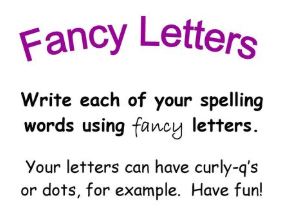03 February 2023
This week, we’ve been learning about using apostrophes. An apostrophe can be used to show that one thing belongs to or is connected to something. This is called a possessive apostrophe.
The cat’s fluffy tail.
An apostrophe because of omission is where an apostrophe is used to indicate the missing letters in a contraction (the shortened form of a word or group of words). For example, should’ve, could’ve.
Create your own sentences using both forms of apostrophes.
The test will take place on Friday 10th February.
27 January 2023
This week, we’ve been learning about adding prefixes. Please learn the following words for a test on Friday 3rd February.
unavailable
unattached
impossible
impractical
illegal
illegible
irregular
disapprove
20.01.23 and 27.01.23
The spellings for the next two weeks continue to be common exception words – words that don’t follow the usual spellings rules or are an exception in some way. In the first week, learn your spellings using the look, say, cover, write, check method. In the second week, try ‘fancy writing’ to write your spellings.
Year 1
- there
- their
- they
- to
- today
Year 2
- child
- children
- Christmas
- class
- climb
- clothes
- cold
- could
- door
- even
27 January 2023
busy
strange
ordinary
particular
continue
accident
complete
surprising
occasional
probable
possible
20 January 2023
This week, we’ve been learning about the prefix co- and re-. Learn the following words for a test on Friday 27th January.
co-operate
co-own
re-enter
re-emerge
co-ordinate
co-exist
re-invent
re-tell
20 January 2023
This week we have been looking at what happens when we add the prefixes -un and -dis to root words. Adding a prefix changes the meaning of the word.
Practise the following spellings in preparation for a test on Friday 27th January.
unkind unfriendly uncertain unclear discontinue disappear disbelief disadvantage
For some creative ideas on how to make learning spellings more fun, check out our super spelling strategies guide.
16 January 2023
In Week 2, we looked at different spellings for the “ie” sound.
Please practise the following words in preparation for a test on Friday 29th January.
bicycle decide describe exercise guide height surprise replied applied why slide cried
For some creative ideas on how to make learning spellings more fun, check out our super spelling strategies guide.
13 January 2023
This week, we’ve been adding suffixes to root words. These have included –ent, -ence, -ant and –ance. Please learn the following words for a test on Friday 20th January.
assistance
tolerant
hesitant
attendance
abundant
violence
dependent
Innocence
confidence
06 January 2023
This week, we have been learning about homophones. Learn these words for a test on Friday 13th January. We recommend putting these words into sentences so that you understand the meaning of each word.
desert
dessert
stationary
stationery
complement
compliment
principle
principal
06.01.23 and 13.01.23
The spellings for the next two weeks continue to be common exception words – words that don’t follow the usual spellings rules or are an exception in some way. In the first week, learn your spellings using the look, say, cover, write, check method. In the second week, try ‘rainbow writing’ to write your spellings in one of the ways below.
Year 1
- school
- she
- so
- some
- the
Year 2
- after
- again
- any
- bath
- beautiful
- because
- behind
- both
- break
- busy



